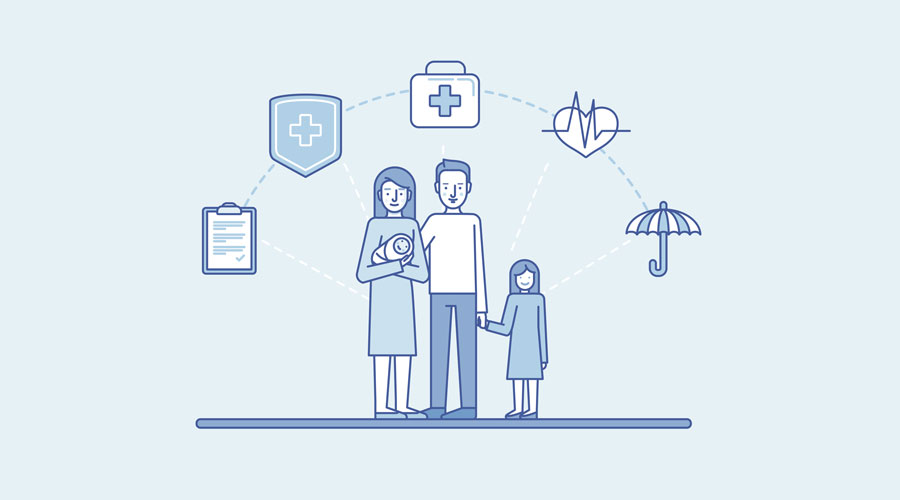Mental health illnesses are among the most common health conditions in the United States. In fact, statistics show that mental health conditions are on the rise while access to care is becoming even more difficult.
The widespread belief is that pharmacists do little more than dispense anti-depression or anxiety medications for those experiencing mental health illnesses. However, the truth is that mental health patients see their pharmacists more often than their psychiatrists or physicians. More roles are emerging for independent pharmacists like you to serve as important access points for patients experiencing mental health crises. The doors are open for you to offer care for those who need it.
“The independent pharmacist has regular interaction with their patients and customers who come into their pharmacy. They really have a clear lens into someone’s behavior. It could be their mood, cognitive function, or overall health. They really get to know their patients on a very personal level,” said Dan Nunn, founder and CEO of Kleen Bill.
As a pharmacist, you serve as an educational resource for your community. You are in a great position to identify early signs of mental health problems in your patients, such as anxiety, depression, post-traumatic stress disorder, or substance or alcohol abuse. You can also help screen patients’ medication lists for drugs that can potentially exacerbate mental illness. When you see all of the medications your patients are having filled, including prescriptions from multiple providers, you’re able to observe and make recommendations to help control the cumulative side effects.
If your patients express concerns over their mental health, gauge the nature and severity of any symptoms before deciding on an appropriate action. Encourage them to seek help through the proper medical channels. You can guide them to the appropriate care provider.
“The pharmacist is part of a team. They’re positioned to offer insight. If they see a patient decline, they most certainly should reach out and try to help that person find a solution. That’s part of the reason they’re there. They can recommend their patient speak to a professional, or they can give them a hotline number,” Nunn said. “The pharmacist has access to all of the local services that are available to help a patient who may need some type of mental health support.”
The next step is to closely monitor your patient’s medication adherence. Monitoring your patients for adherence is important, as patients with mental health conditions typically have low adherence rates with their psychiatric medications. Nonadherence includes patients who don’t fill initial prescriptions, adjust their own dosing regimens, or completely stop their medications. The cost of medications, side effects, and patients’ beliefs regarding the medication are some of the reasons for nonadherence.
The World Health Organization has laid out five sets of factors that affect patients’ medication adherence.
- Social and economic-related factors, such as poor socioeconomic status, a low level of education, and unemployment.
- Healthcare system/healthcare team-related factors, such as poor medication distribution systems and overworked healthcare providers.
- Therapy-related factors, such as duration of treatment, previous treatment failures, and the immediacy of beneficial effects.
- Condition-related factors, such as severity of symptoms, level of disability, and availability of effective treatments.
- Patient-related factors, such as disbelief in the diagnosis, forgetfulness, and low motivation.
If not appropriately supported by health care, patients face risks that can potentially be life threatening. Most of the care needed for chronic conditions is based on patient self-management, use of medical technology for monitoring, and changes in lifestyle. By improving adherence, patients’ safety is enhanced.
You can help your patients better adhere to their medications by recommending the use of pill boxes that have compartments for each day of the week. It’s a great way for them to organize their medications, and it will let them know if they missed a day. You can also encourage them to keep a list of the medications they take and to include the name of the drug, the dosage, when they take it, and what it’s for. Then, advise them to give a copy to their family members and physician in case of an emergency.
Do you have patients who use more than one pharmacy? If so, the CDC’s recommendation is that you suggest your patients only use one pharmacy. This ensures all patient records are in one single location. This can help you lessen any adverse events, and better track your patients’ progress over time.
If you’re nervous about helping patients with their mental health, think about partnering with mental health providers. You can join with psychiatrists, psychologists, therapists, social workers, or mental health clinics. Here’s why this is important:
Better understanding and care.
By collaborating with providers, you will better understand a patient’s situation and prescriptions. You can educate the patient, counsel them on potential side effects, and monitor their adherence. You can also keep the provider in the loop by feeding information back to them. If an issue were to arise, your relationship with the provider will make it easier to communicate and collaboratively resolve the issue. This results in better care for the patient.
Learn from the experts
As a pharmacist, you have expertise in serving and educating your patients on many things in your pharmacy. However, you’re not an expert on mental health. But by working with mental health experts in your area, you’ll have resources to contact for assistance with any mental health matters.
Grow your business
When you partner with providers, your pharmacy business will expand. Working with mental health providers will help them see the close, personal care you provide their patients. Your pharmacy will flourish by building that kind of trust.
“With limited or low access to quality, affordable care in a community, pharmacists can use their experience and expertise to understand what their patients need,” said Nick Smock, PharmD, MBA, President and CEO of PBA Health. “Businesses like Walmart and Best Buy are offering solutions to the market that were unthinkable 10 years ago. The question is, what can we as pharmacists offer in the form of behavioral or mental health? Telehealth may be a possibility and an opportunity without the cost of an actual clinic and wouldn’t compete with local physicians.”
Medications to Look Out For
Many types of medications are associated with causing and worsening depression symptoms as a side effect, even in people who aren’t prone to depression. These include:
- Beta-blockers
- Corticosteroids
- Benzodiazepines
- Parkinson’s drugs
- Drugs that affect hormones
- Stimulants
- Anticonvulsants
- Proton pump inhibitors (PPIs) and H2 blockers
- Statins and other cholesterol-lowering drugs
- Anticholinergic drugs.
Because depression is common in patients with medical illness, it can be tough to know for sure if these medications are to blame for the mood symptoms. Here are some common signs to watch for:
- Feelings of hopelessness or helplessness
- Feelings of guilt or worthlessness
- Anxiety
- Irritability and restlessness
- Fatigue and low energy
- Problems with sleep
- Problems with appetite or weight
- Problems with thinking, memory, and concentration
- Loss of interest in things once enjoyed
- Thoughts of death or suicide
Practicing Self Care in Your Pharmacy
The overall health of your pharmacy relies on the mental wellbeing of you and your team. That’s why it’s so important to make mental health a priority in your pharmacy. Try following the tips below to keep your pharmacy from burnout.
Make time off a priority.
Overworking your staff can take a toll on their mental health. Studies have proven this. In fact, over 90 percent of Americans feel overworked, and over 70 percent say the pressures of their workplace affect their personal lives. Overworking can wreak havoc on your mental health. It can lead to depression, anxiety, exhaustion, decreased job performance, high blood pressure, and worse. That’s why it’s so important for you and your staff to take time off to avoid burnout.
Make your pharmacy a safe space.
When the pressure and demands of work build up, your staff might keep their stress hidden. Therefore, you don’t know who’s struggling and who isn’t. While you can’t force your staff to share what they’re experiencing, you can be understanding and accepting. Be sure they know that your pharmacy is a safe space where they can open up to you without judgment, and that you’ll do your best to support their needs.
Take breaks.
All of your pharmacy staff should be taking at least one break during the workday. However, when it gets busy and everyone is struggling to keep up, breaks are often skipped. Make it a goal to keep these occurrences to a bare minimum, especially since federal and state laws govern mandatory break periods. Downtime is important, especially in a high-stress field like pharmacy. By reinforcing breaks, you’re sending your staff the message that their well-being is just as important as the well-being of your patients.
Make your staff feel appreciated.
There are numerous ways to make your staff feel appreciated. Give raises to well-deserving team members, have a pizza party, provide lunch for your team on a regular basis, reward hardworking or struggling team members with gift cards to their favorite places, or give them a handwritten note thanking them for being such an awesome employee.
Be mindful of expectations and goals.
Don’t put unnecessary pressure on your staff. Instead, regularly talk to them to get their perspective on their workloads. This will give you a better idea of what you can add to their plates without overwhelming them.
As you focus on everyone else’s mental health, be sure to pay attention to your own. A work/life balance can be challenging for many independent pharmacists. Implement the mental health advice you give to your patients and staff, and regularly check in with yourself to assess the state of your mental health. Adjust things as needed so you can set an excellent example for your patients and staff by making mental health a priority. You’ll provide better care for others when you’re at your best.
Statistics released by the 2023 State of Mental Health in America survey:
- 21% of adults (roughly 50 million people) are experiencing at least one mental illness.
- 55% of adults with a mental illness have not received treatment.
- 5.44% of adults experience severe mental illness.
- 4.8% of adults (over 12.1 million) have reported serious thoughts of suicide.
Five Mental Health Apps
If you sense a patient needs help, but they’re afraid to reach out to a specialist, recommend one of these apps. Each one has their own unique options for those who need a place to chat with others, talk with a therapist, meditate, or de-stress.
Headspace:
This is a favorite because it’s affordable, has a wide range of resources, and excellent expert-informed content. You can de-stress, learn how to wake up and get energized, and tips on increasing your movement throughout the day.
TalkSpace:
This app is a leader in the therapy space due to its convenience, range of services, and easy therapist matching process. Talkspace offers a variety of plans, however the pricing isn’t a fit for everyone and sessions are only 30 minutes long. The company is in-network with many major insurance plans.
Circles:
This app is a great mental health app for addiction. It offers support groups for a variety of concerns, it has sobriety-specific groups, coping tools, and more. Your first session is free, and then they offer a membership plan.
Calm:
Calm is a wonderful sleep app with a dreamy and soothing aesthetic that specifically targets sleeplessness. It features a wide range of meditations and sleep stories for kids and adults alike. Plus, therapists, meditation experts and coaches are all featured on the app.
Sanvello:
This mental health app has resources designed to decrease anxiety symptoms by using a well-rounded approach that focuses on self-care, peer support, coaching, and therapy. It’s also an in-network with some insurance providers. A free trial is available, and the monthly fee is on the low end.
Kleen Bill helps pharmacists provide virtual care for their patients. Pharmacists can offer on-demand virtual healthcare services for families that include telehealth and teletherapy services, veterinarian visits, and even legal services. Kleen Bill is currently accepting pharmacies to be a part of their pilot program over the next six months.
From the Magazine
This article was published in our quarterly print magazine, which covers relevant topics in greater depth featuring leading experts in the industry. Subscribe to receive the quarterly print issue in your mailbox. All registered independent pharmacies in the U.S. are eligible to receive a free subscription.
More articles from the June 2023 issue:
- Cracking Down on Copycats
- Leveraging Non-Pharmacy Assets
- Diagnostic Testing
- Diabetes Management
- Arthritis Care
- Mentoring a Junior Partner
- Quit for Good
- Mental Health Care
A Member-Owned Company Serving Independent Pharmacies
PBA Health is dedicated to helping independent pharmacies reach their full potential on the buy-side of their business. Founded and run by pharmacists, PBA Health serves independent pharmacies with group purchasing services, wholesaler contract negotiations, proprietary purchasing tools, and more.
An HDA member, PBA Health operates its own NABP-accredited warehouse with more than 6,000 SKUs, including brands, generics, narcotics CII-CV, cold-storage products, and over-the-counter (OTC) products — offering the lowest prices in the secondary market.












